小学动词第三人称单数形式用法+练习
动词第三人称单数练习题
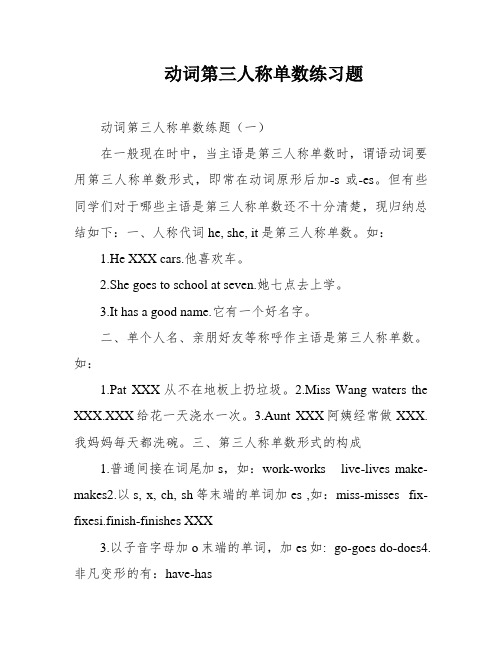
动词第三人称单数练习题动词第三人称单数练题(一)在一般现在时中,当主语是第三人称单数时,谓语动词要用第三人称单数形式,即常在动词原形后加-s或-es。
但有些同学们对于哪些主语是第三人称单数还不十分清楚,现归纳总结如下:一、人称代词he, she, it是第三人称单数。
如:1.He XXX cars.他喜欢车。
2.She goes to school at seven.她七点去上学。
3.It has a good name.它有一个好名字。
二、单个人名、亲朋好友等称呼作主语是第三人称单数。
如:1.Pat XXX从不在地板上扔垃圾。
2.Miss Wang waters the XXX.XXX给花一天浇水一次。
3.Aunt XXX阿姨经常做XXX.我妈妈每天都洗碗。
三、第三人称单数形式的构成1.普通间接在词尾加s,如:work-works live-lives make-makes2.以s, x, ch, sh等末端的单词加es ,如:miss-misses fix-fixesi.finish-finishes XXX3.以子音字母加o末端的单词,加es如: go-goes do-does4.非凡变形的有:have-has四、问句:问句中遇到第三人称单数时,需要用助动词does,动词变为原形。
What does she like?When XXX?How often does your sister comb her hair?操演1、将括号里动词的恰当方式填入横线上。
1. I ________ XXX)2. He _________ in the corridors. (run)3. She ___________ her face once a day. (wash)4. They ____________ their teeth once a day. (brush)5. You ___________ up your clothes once a day. (hang)6. We____________ our home work once a day. (finish)7. He____________ rubbish in the classroom. (throw)8. She_____________ rubbish on the floor. (throw)9. I_____________ rubbish in the bin. (throw)10. They ___________ the table once a day. (set)11. Peter never _________ in the corridors. (run)12. Mary usually _________ the table. (set)13. Pat and Ken _________ the plants in the morning. (water)14. The boy __________ his hair once a day. (comb)15. Miss Cheng _________ TV at home. (watch)16. My sister __________ XXX(pack)17. My mother _________ dinner for me. (cook)18. My parents _________ the house at Chinese New Year. (clean)19. My teachers _________ us some gifts. (give)20. My friends _________ the table with me. (set)操演2、挑选精确的单词填到括号里。
第三人称单数专项练习(动词)
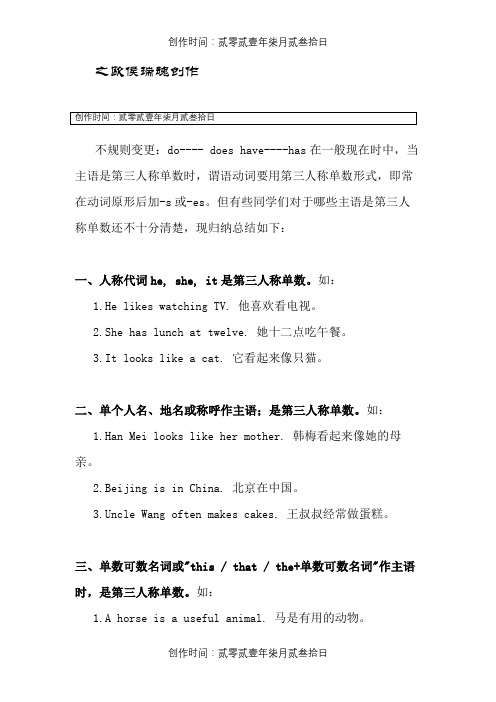
之欧侯瑞魂创作不规则变更:do---- does have----has在一般现在时中,当主语是第三人称单数时,谓语动词要用第三人称单数形式,即常在动词原形后加-s或-es。
但有些同学们对于哪些主语是第三人称单数还不十分清楚,现归纳总结如下:一、人称代词he, she, it是第三人称单数。
如:1.He likes watching TV. 他喜欢看电视。
2.She has lunch at twelve. 她十二点吃午餐。
3.It looks like a cat. 它看起来像只猫。
二、单个人名、地名或称呼作主语;是第三人称单数。
如:1.Han Mei looks like her mother. 韩梅看起来像她的母亲。
2.Beijing is in China. 北京在中国。
3.Uncle Wang often makes cakes. 王叔叔经常做蛋糕。
三、单数可数名词或"this / that / the+单数可数名词"作主语时,是第三人称单数。
如:1.A horse is a useful animal. 马是有用的动物。
2.This book is yours. 这本书是你的。
3.That car is red. 那辆小汽车是红色的。
4.The cat is Lucy's. 这只猫是露茜的。
四、不定代词someone, somebody, nobody, everything, something等及指示代词this, that作主语时,是第三人称单数。
如:1.Everyone is here. 大家到齐了。
2.There is something wrong with the watch. 这块手表有毛病。
3.This is a pen. 这是一支钢笔。
4.That is an eraser. 那是一块橡皮擦。
五、不成数名词作主语时为第三人称单数。
如:1.The milk is in the glass. 牛奶在玻璃杯里。
第三人称单数练习题及答案

第三人称单数练习题及答案英语中的第三人称单数指的是“他/她/它”。
在使用动词时,第三人称单数的形式与其他人称有所不同。
学好第三人称单数的用法对于英语学习者来说是非常重要的,因为它在英语中经常被使用。
在本文中,我们将提供一些练习题和各种情况下的答案,以帮助学习者更好地掌握第三人称单数的语法规则。
练习题一:将以下短语改写为第三人称单数形式。
1. I eat breakfast at 7 am.2. She drinks coffee every morning.3. He doesn't like vegetables.4. They watch TV in the evening.5. We play football on Saturdays.答案一:1. He eats breakfast at 7 am.2. She drinks coffee every morning.3. He doesn't like vegetables.4. They watch TV in the evening.5. They play football on Saturdays.练习题二:在下面填入正确的动词形式。
1. The cat ___ (sleep) on the sofa.2. The boy ___ (walk) to school every day.3. The dog ___ (bark) at the mailman.4. The flowers ___ (smell) wonderful.5. The bird ___ (sing) in the tree.答案二:1. The cat sleeps on the sofa.2. The boy walks to school every day.3. The dog barks at the mailman.4. The flowers smell wonderful.5. The bird sings in the tree.练习题三:在下面填入正确的动词形式。
完整版)小学动词第三人称单数讲解及练习

完整版)小学动词第三人称单数讲解及练习一般现在时是指在现在发生的动作或状态。
它有三个基本用法:1.描述事物或人的特征和状态,例如“天空是蓝色的”。
2.表示经常性或惯性的动作,例如“我每天六点起床”。
3.描述客观现实,例如“地球绕着太阳转”。
在一般现在时中,当主语是第三人称单数时,谓语动词要用第三人称单数形式,即常在动词原形后加-s或-es。
常见的时间状语有always,every week (day。
year。
month…),once a week,every…,sometimes,at…,on Sunday,usually,often,never,hardly等。
主语可以是人称代词he。
she。
it,单个人名、地名或称呼,单数可数名词或“this / that / the+单数可数名词”,以及不定代词someone。
somebody。
nobody。
everything。
something等及指示代词this。
that。
例如,“他喜欢看电视”、“XXX看起来像她的母亲”、“马是有用的动物”、“这本书是你的”、“这只猫是XXX的”、“大家到齐了”、“这块手表有毛病”、“这是一支钢笔”。
④This is an eraser.XXX is used as the subject。
it takes the third person singular form。
For example:①The milk is in the glass.②The bread is very small.When a number or letter is used as the subject。
it is treated as third person XXX:①"6" XXX.②"I" XXX.The rule for adding -s or -es to verbs in the third person singular form is as follows:1.In general。
动词第三人称单数的变化规则及练习
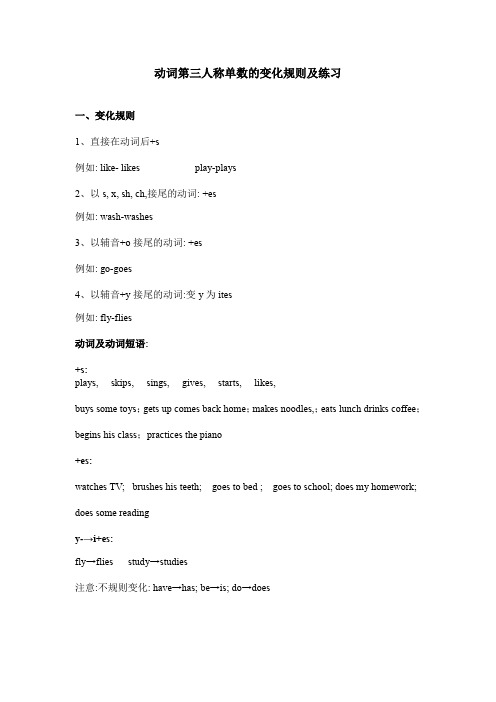
动词第三人称单数的变化规则及练习一、变化规则1、直接在动词后+s例如:like- likes play-plays2、以s,x,sh,ch,接尾的动词:+es例如:wash-washes3、以辅音+o接尾的动词:+es例如:go-goes4、以辅音+y接尾的动词:变y为ites例如:fly-flies动词及动词短语:+s:plays,skips, sings,gives,starts,likes,buys some toys;gets up comes back home;makes noodles,;eats lunch drinks coffee;begins his class;practices the piano+es:watches TV; brushes his teeth; goes to bed ; goes to school; does my homework; does some readingy-→i+es:fly→flies study→studies注意:不规则变化:have→has; be→is; do→does一、写出下列动词的第三人称单数drink go stay makelook have pass carrycome watch plant fly二、请看下面两组句子,注意区分他们的共同点和不同点。
I go to school every day.I don't go to school every day.He goes to school every day.He doesn't go to school every day.Do you go to school every day?Yes,I do.(No,I don't)Does he go to school every day?Yes,he does.(No,he doesn't)注:1)第三人称单数用了does后面就不用动词的S形式了.而用动词原形。
小学动词第三人称单数形式用法+练习
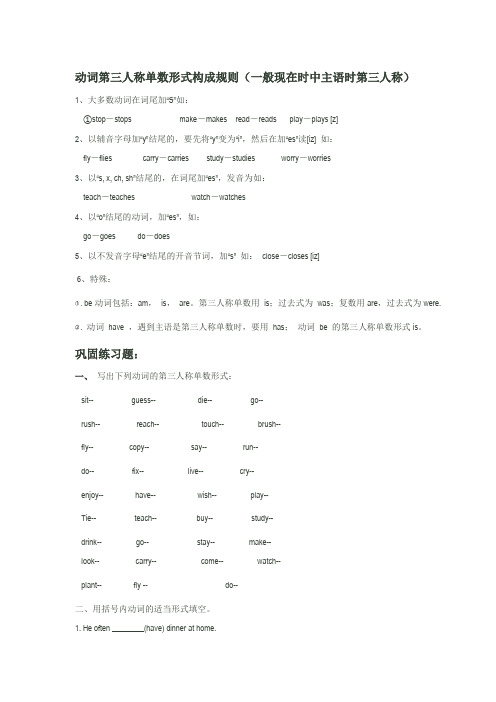
动词第三人称单数形式构成规则(一般现在时中主语时第三人称)1、大多数动词在词尾加“S”如:①stop-stops make-makes read-reads play-plays [z]2、以辅音字母加“y”结尾的,要先将“y”变为“i”,然后在加“es”读[iz] 如:fly-flies carry-carries study-studies worry-worries3、以“s, x, ch, sh”结尾的,在词尾加“es”,发音为如:teach-teaches watch-watches4、以“o”结尾的动词,加“es”,如:go-goes do-does5、以不发音字母“e”结尾的开音节词,加“s” 如:close-closes [iz]6、特殊:○1. be动词包括:am,is,are。
第三人称单数用is;过去式为was;复数用are,过去式为were. ○2. 动词have ,遇到主语是第三人称单数时,要用has;动词be 的第三人称单数形式is。
巩固练习题:一、写出下列动词的第三人称单数形式:sit-- guess-- die-- go--rush-- reach-- touch-- brush--fly-- copy-- say-- run--do-- fix-- live-- cry--enjoy-- have-- wish-- play--Tie-- teach-- buy-- study--drink-- go-- stay-- make--look-- carry-- come-- watch--plant-- fly -- do--二、用括号内动词的适当形式填空。
1. He often ________(have) dinner at home.2. Daniel and Tommy _______(be) in Class One.3. We _______(not watch) TV on Monday.4. Nick _______(not go) to the zoo on Sunday.5. ______ they ________(like) the World Cup?6. What _______they often _______(do) on Saturdays?7. _______ your parents _______(read) newspapers every day?8. The girl _______(teach) us English on Sundays.9. She and I ________(take) a walk together every evening.10. There ________(be) some water in the bottle.11. Mike _______(like) cooking.12. They _______(have) the same hobby.13. My aunt _______(look) after her baby carefully.14. You always _______(do) your homework well.15. I _______(be) ill. I’m staying in bed.16. She _______(go) to school from Monday to Friday.17. Liu Tao _______(do) not like PE.18. The child often _______(watch) TV in the evening.19. Su Hai and Su Yang _______(have) eight lessons this term.20. -What day _______(be) it today?-It’s Saturday.三、改错(划出错误的地方,将正确的写在横线上)1. Is your brother speak English? __________________2. Does he likes going fishing? __________________3. He likes play games after class. __________________4. Mr. Wu teachs us English. __________________5. She don’t do her homework on Sundays. _________________。
五年级动词的第三人称单数形式训练

动词的第三人称单数形式训练一.朗读下列单词,照样子抄写三遍。
play---plays _____________ _____________ _____________write---writes _____________ _____________ _____________take---takes _____________ _____________ _____________skate---skates _____________ _____________ _____________go---goes _____________ _____________ _____________watch---watches _____________ _____________ _____________wash---washes _____________ _____________ _____________do---does _____________ _____________ _____________have---has _____________ _____________ _____________study---studies _____________ _____________ _____________fly---flies _____________ _____________ _____________tesch---teaches _____________ _____________ _____________总结:动词的第三人称单数有4种变化形式:1.直接在动词后+s 如:like-likes 2.以s、x、sh、ch、o结尾的动词:+es 如:wash-washes 3.以辅音+y结尾的动词:变y为i+es 如:fly-flies 4.特殊变化形式如:have-has二.动词的第三人称单数专项练习1.Mike ______(do)his homework at eight in the evening.2.----Your uncle ______(draw) horses very well. Right? ----Yes, he _____3.His father often ______(read) books in the library on Saturday.4.My mother usually ______ (watch)TV plays at home.5.My cousin sometimes ______ (play) cards with me.6.She ______(go) to school by bus every day.7.He usually ______(listen) to the radio in the morning.8.______ he usually ______ (listen) to the music at home ? No, he ______ .9.----What ______ Nancy usually ______ after school ?----She usually ______(teach) Lingling English10.----What ______ Su Yang ______ on Saturday afternoon?----She often ______(study) English三.想一想,下面的题目是不是也符合一般现在时第三人称单数的要求呢?为什么?请你把关键词圈出来再做题目!1. I ______ (go)to school at seven in the morning .2. ---- ______ you often ______ (study) English after school ? ----Yes, I do .3. Mike and Tom usually ______ (fly) kites on Sunday.4. They ______ (go) to school by bus every day.5. We usually ______ (listen) to the radio in the morning.6. ----______ you often ______ (make) clothes in the evening ? ---Yes, I ______.7. ----What ______you usually______ on Friday evening ?----I usually ______(do)myhomework.8. ----What ______Liu Tao’s parents usually ______on Saturdays?---They usually ______(go)shopping9.----What ______ David and Peter usually ______ on Sunday afternoon ?----They usually ______ (play) football.10.______Yang Ling and Yanlili ______ (water) trees in the evening?----No, they_____ .总结:当表示某个人或某些人经常性的事情、有规律的事情时,用一般现在时态。
动词三单形式专项练习
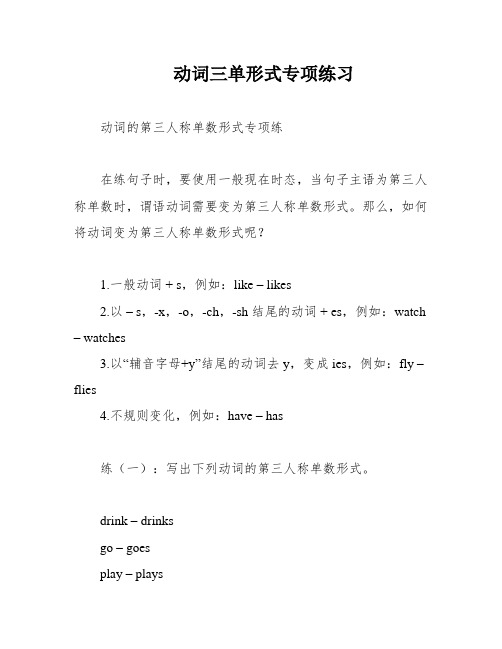
动词三单形式专项练习动词的第三人称单数形式专项练在练句子时,要使用一般现在时态,当句子主语为第三人称单数时,谓语动词需要变为第三人称单数形式。
那么,如何将动词变为第三人称单数形式呢?1.一般动词 + s,例如:like – likes2.以– s,-x,-o,-ch,-sh 结尾的动词 + es,例如:watch – watches3.以“辅音字母+y”结尾的动词去 y,变成 ies,例如:fly –flies4.不规则变化,例如:have – has练(一):写出下列动词的第三人称单数形式。
drink – drinksgo – goesplay – playsmake – makeslook – lookshave – haspass – passescry – criescome – comeswatch – watchesplant – plantsfly – fliesstudy – studieswash – washesdo – doesteach – teaches练(二):用所给动词的正确形式填空。
1.He often has dinner at home.2.Daniel and Tommy are in Class One.3.We do not watch TV on Monday.4.Nick does not go to the zoo on Sunday.5.Do they like the World Cup?6.What do they often do on Saturdays?7.Do your parents read newspapers every day?8.The girl teaches us English on Sundays.9.She and I take a walk together every evening.10.There is some water in the bottle.11.Mike likes cooking.12.They have the same hobby.13.My aunt looks after her baby carefully.14.You always do your homework well.15.I am ill and staying in bed.16.She goes to school from Monday to Friday.Note: No changes needed for these four sentences)17.Bill does not enjoy physical n。
动词的第三人称单数及练习
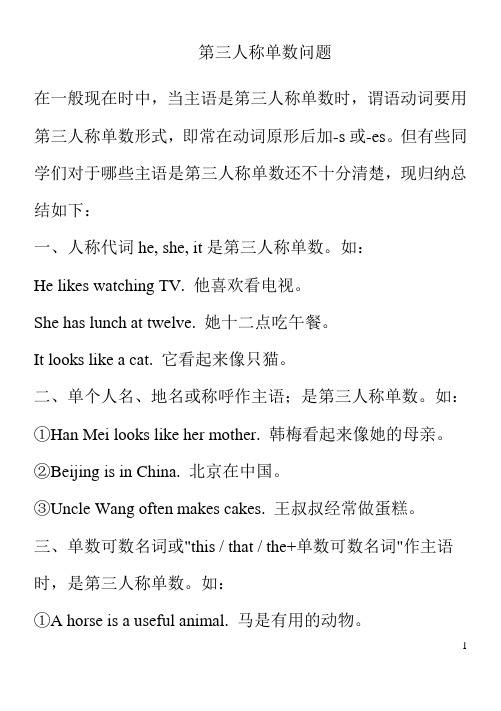
第三人称单数问题在一般现在时中,当主语是第三人称单数时,谓语动词要用第三人称单数形式,即常在动词原形后加-s或-es。
但有些同学们对于哪些主语是第三人称单数还不十分清楚,现归纳总结如下:一、人称代词he, she, it是第三人称单数。
如:He likes watching TV. 他喜欢看电视。
She has lunch at twelve. 她十二点吃午餐。
It looks like a cat. 它看起来像只猫。
二、单个人名、地名或称呼作主语;是第三人称单数。
如:①Han Mei looks like her mother. 韩梅看起来像她的母亲。
②Beijing is in China. 北京在中国。
③Uncle Wang often makes cakes. 王叔叔经常做蛋糕。
三、单数可数名词或"this / that / the+单数可数名词"作主语时,是第三人称单数。
如:①A horse is a useful animal. 马是有用的动物。
②This book is yours. 这本书是你的。
③That car is red. 那辆小汽车是红色的。
④The cat is Lucy's. 这只猫是露茜的。
四、不定代词someone, somebody, nobody, everything, something等及指示代词this, that作主语时,是第三人称单数。
如:①Everyone is here. 大家到齐了。
②There is something wrong with the watch. 这块手表有毛病。
③This is a pen. 这是一支钢笔。
④That is an eraser. 那是一块橡皮擦。
五、不可数名词作主语时为第三人称单数。
如:①The milk is in the glass. 牛奶在玻璃杯里。
②The bread is very small. 那面包很小。
动词第三人称单数规则及练习题

动词第三人称单数形式构成规则及练习题动词第三人称单数形式构成规则动词原形变第三人称单数的规则与发音规律同名词单数变复数大致相同,请认真观察。
1、大多数动词在词尾加“S”在清辅音后发音为[s],在浊辅音及元音后发音为 [z]。
如:①stop-stops [s] ; make-makes [s] ②read-reads [z] ; play-plays [z]2、以辅音字母加“y”结尾的,要先将“y”变为“i”,然后在加“es”读[iz] 如:fly-flies [z]; carry-carries [z] study-studies [z]; worry-worries 3、以“s, x, ch, sh”结尾的,在词尾加“es”,发音为[iz] 如:teach-teaches [iz]; watch-watches [iz]4、以“o”结尾的动词,加“es”,读[z] 如: go-goes [z] do-does [zbe动词包括:am, is, are。
第三人称单数用 is;过去式为 was;复数用are,过去式为were.除上述规律外,还应注意下面三点:1. 动词 have ,遇到主语是第三人称单数时,要用 has;动词 be 的第三人称单数形式是is。
2. 含有动词第三人称单数形式的句子变否定句时,要用 doesn't + 动词原形,如:He goes to school at six in the morning. (变否定句)→ He doesn't go to school at six in the morning.3. 对含有动词第三人称单数形式的句子提问时,要用助动词 does,如:She goes home at five every day. (对划线部分提问)→ When / What time does she go home every day?巩固练习题:I写出下列动词的第三人称单数形式:sit-- guess-- die-- go-- rush-- reach-- touch-- brush-- fly-- copy-- say-- run-- do-- fix-- live-- cry-- enjoy-- have-- wish-- play—tie-- teach-- buy-- study-- drink-- go-- stay-- make-- look-- carry-- come-- watch-- plant-- fly-- do--二、用括号内动词的适当形式填空。
动词第三人称单数变化规则及练习
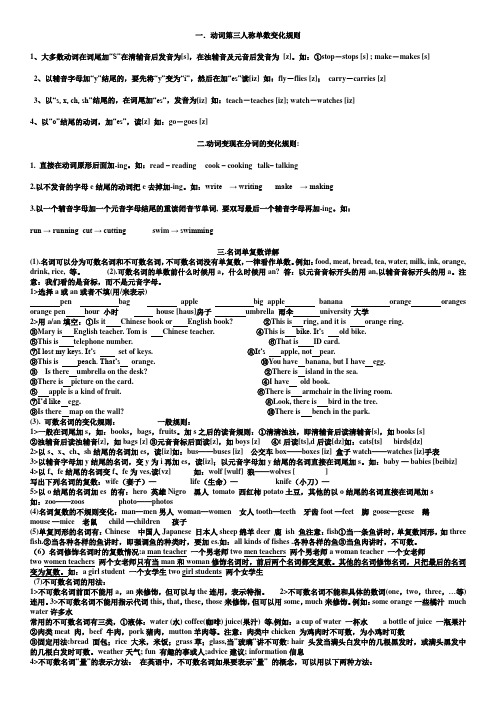
一.动词第三人称单数变化规则1、大多数动词在词尾加“S”在清辅音后发音为[s],在浊辅音及元音后发音为[z]。
如:①stop-stops [s] ; make-makes [s]2、以辅音字母加“y”结尾的,要先将“y”变为“i”,然后在加“es”读[iz] 如:fly-flies [z];carry-carries [z]3、以“s, x, ch, sh”结尾的,在词尾加“es”,发音为[iz] 如:teach-teaches [iz]; watch-watches [iz]4、以“o”结尾的动词,加“es”,读[z] 如:go-goes [z]二.动词变现在分词的变化规则:1. 直接在动词原形后面加-ing。
如:read – reading cook – cooking talk– talking2.以不发音的字母e结尾的动词把e去掉加-ing。
如:write → writing make → making3.以一个辅音字母加一个元音字母结尾的重读闭音节单词, 要双写最后一个辅音字母再加-ing。
如:run → running cut → cutting swim → swimming三.名词单复数详解(1).名词可以分为可数名词和不可数名词,不可数名词没有单复数,一律看作单数。
例如:food, meat, bread, tea, water, milk, ink, orange, drink, rice, 等。
(2).可数名词的单数前什么时候用a,什么时候用an? 答:以元音音标开头的用an,以辅音音标开头的用a。
注意:我们看的是音标,而不是元音字母。
1>选择a或an或者不填(用/来表示)pen bag apple big apple banana orange oranges orange pen hour 小时house [haus]房子umbrella 雨伞university大学2>用a/an填空:①Is it Chinese book or English book? ②This is ring, and it is orange ring.③Mary is English teacher. Tom is Chinese teacher. ④This is bike. It’s old bike.⑤This is telephone number. ⑥That is ID card.⑦I lost my keys. It’s set of keys. ⑧It’s apple, not pear.⑨This is peach. That’s orange. ⑩You have banana, but I have egg.③Is there umbrella on the desk? ②There is island in the sea.③There is picture on the card. ④I have old book.⑤apple is a kind of fruit. ⑥There is armchair in the living room.⑦I’d like egg. ⑧Look, there is bird in the tree.⑨Is there map on the wall? ⑩There is bench in the park.(3). 可数名词的变化规则:一般规则:1>一般在词尾加s,如:books,bags,fruits。
小学动词第三人称单数形式用法+练习

小学动词第三人称单数形式用法+练习一般现在时中的第三人称单数形式一般现在时用于表示事物或人物的特征、状态、经常性或惯性的动作,以及客观现实。
当主语为第三人称单数时,谓语动词应使用第三人称单数形式,即在动词原形后加-s或-es。
一般现在时的基本用法一般现在时有以下基本用法:1.表示事物或人物的特征、状态,如“天空是蓝色的”;2.表示经常性或惯性的动作,如“我每天六点起床”;3.表示客观现实,如“地球绕着太阳转”。
标志词(时间状语)包括always。
every week (day。
year。
month…)。
once a week。
every…。
sometimes。
at…。
on Sunday。
usually。
often。
never。
hardly等。
哪些主语是第三人称单数?以下主语是第三人称单数:1.人称代词he。
she。
it,如“他喜欢看电视”;2.单个人名、地名或称呼作主语,如“XXX看起来像她的母亲”;3.单数可数名词或“this / that / the+单数可数名词”作主语时,如“马是有用的动物”;4.不定代词someone。
somebody。
nobody。
everything。
something等及指示代词this。
that作主语时,如“大家到齐了”。
1.This is a pen。
(改写) This object is a XXX.2.That is an eraser。
(改写) The object over there is a rubber eraser.3.The milk is in the glass。
(改写) The glass contains milk.4.The bread is very small。
(改写) The size of the bread isvery small.5."6" is a lucky number。
(改写) The number "6" is XXX.6."I" XXX(改写) The character "I" is a letter.7.大多数动词在词尾加“S”。
- 1、下载文档前请自行甄别文档内容的完整性,平台不提供额外的编辑、内容补充、找答案等附加服务。
- 2、"仅部分预览"的文档,不可在线预览部分如存在完整性等问题,可反馈申请退款(可完整预览的文档不适用该条件!)。
- 3、如文档侵犯您的权益,请联系客服反馈,我们会尽快为您处理(人工客服工作时间:9:00-18:30)。
① Han Mei looks like her mother. 韩梅看起来像她的母亲。
般现在时中的第三人称单数形式
在一般现在时中,当主语是第三人称单数时,谓语动词要用第三人称单数形式,即常在动词原形 后加-s 或-es 。
(一) 什么是一般现在时? 一般现在时的基本用法有哪些呢?
【一般现在时的功能】 1.
表示事物或人物的特征、状态。
如: The sky
is blue.天空是蓝色的。
2.
表示经常性或习惯性的动作。
如: I get up at six
every day.我每天六点起床。
标志词(时间状语):
always, every week (day, year, month …),
once a week, every …,sometimes, at …,on Sun day uauslly often,never,hardly
__________________________________丿
3.表示客观现实。
如: The earth goes around the sun.地球绕着太阳
(二)哪些主语是第三人称单数?现归纳总结如下:
单个人名、地名或称呼作主语;是第三人称单数。
如
、人称代词 he, she, it He likes watch ing TV.
he has lunch at twelve.
It looks like a cat.
是第三人称单数。
如:
他喜欢看电视。
她十二点吃午
餐。
②Beijing is in China. 北京在中国。
③Uncle Wang often makes cakes. 王叔叔经常做蛋糕。
三、单数可数名词或"this / that / the+ 单数可数名词" 作主语时,是第三人称单数。
如:
① A horse is a useful animal. 马是有用的动物。
②This book is yours. 这本书是你的。
③That car is red. 那辆小汽车是红色的。
④The cat is Lucy's. 这只猫是露茜的。
四、不定代词someone, somebody, nobody, everything, something 等及指示代词this,
that 作主语时,是第三人称单数。
如:
①Everyone is here. 大家到齐了。
②There is something wrong with the watch. 这块手表有毛病。
③This is a pen. 这是一支钢笔。
④That is an eraser. 那是一块橡皮擦。
五、不可数名词作主语时为第三人称单数。
如:
① The milk is in the glass. 牛奶在玻璃杯里。
② The bread is very small. 那面包很小。
六、当数字或字母作主语时,看作第三人称单数。
如:
① "6" is a lucky number. "6" 是个吉利数字。
②"I" is a letter. T 是个字母。
(三)一般现在时
时第三人称
动词第三人称单数形式构成规则(一般现在时中主语
1大多数动词在词尾加“S”如:
① stop —stops make —makes read —reads play —plays [z]
2、以辅音字母加“ y ”结尾的,要先将“ y ”变为“ i”,然后在加“ es ”读[iz]女口:
fly —flies carry —carries study —studies worry —worries
3、以“ s, x, ch, sh ”结尾的,在词尾加“ es”,发音为如:
teach —teaches watch —watches
4、以“ o”结尾的动词,加“ es”,如:
go —goes do —does
5、以不发音字母“ e”结尾的开音节词,加“s”女口:close —closes [iz]
6、特殊:
① .be动词包括:am, is , are。
第三人称单数用is ;过去式为was ;复数用are,过去式为
② .动词have ,遇到主语是第三人称单数时,要用has ;动词be的第三人称单数形式were. is。
四)巩固练习题:
写出下列动词的第三人称单数形式:
sit-
die- rush--
guess-
go- reach--
touch-- brush--
do--
、用括号内动词的适当形式填空。
1. He often ______ (have) dinner at home. 2. Daniel and Tommy ______ (be) in Class One. 3. We _____ (not watch) TV on Monday. 4. Nick ____ (not go) to the zoo on Sunday. 5. ____ they ______ (like) the World Cup? 6. What ___ they often ______ (do) on Saturdays?
7. _____ your parents ______ (read) newspapers every day? 8. The girl _____ (teach) us English on Sundays. 9. She and I _____ (take) a walk together every evening. 10. There ______ (be) some water in the bottle.
fly--
copy--
say--
do-
live--
enjoy--
wish--
Tie-
buy--
run-
fix-
cry-
have-
play--
teach--
study--
drink--
stay--look--come--
go-
make-carry--watch--
plant--
fly
11. Mike _____ (like) cooking.
12. They _____ (have) the same hobby.
13. My aunt ____ (look) after her baby carefully.
14. You always _____(do) your homework well.
15. I _____ (be) ill. I ' m staying in bed.
16. She _____ (go) to school from Monday to Friday.
17. Liu Tao _____ (do) not like PE.
18. The child often _____ (watch) TV in the evening.
19. Su Hai and Su Yang _____ (have) eight lessons this term.
20. -What day _____ (be) it today?
-It ' s Saturday
三、改错(划出错误的地方,将正确的写在横线上)
1. Is your brother speak English? _________________
2. Does he likes going fishing? _________________
3. He likes play games after class. _______________
4. Mr. Wu teachs us English. ________________
5. She don ' t do her homework on Sundays. _________________。
